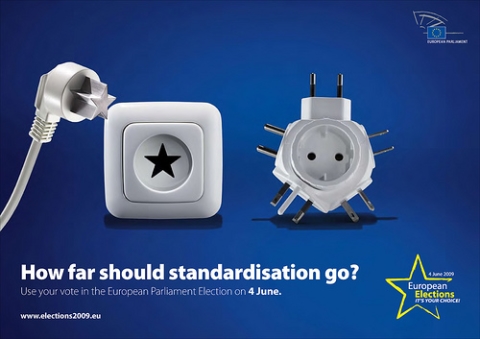
The worldwide economic and financial crisis and the subsequent European sovereign debt crisis have shaken the European Union to its foundations. There has always been widespread criticism of the EU’s democratic legitimacy in the broad public and the media, but the discussion is even more salient today. To many – especially the UK tabloids – the EU is an inefficient bureaucratic monster, run by elitist eurocrats who act completely detached from European citizens. The EU takes these accusations seriously and responds with various “myths and facts” collections, where common misconceptions of the EU are corrected (see this example of the EC’s response to budget “myths”). However, it is worthwhile mentioning that some 56% percent of EU citizens are satisfied with “the way democracy works in the European Union” (see Eurobarometer chart below), which is a respectable result, even in comparison to national figures.
So what is it with democracy and the EU? There is of course no simple answer and a lively scholarly discussion is underway about democracy in the European Union, or the lack thereof.
Critics of the EU point out that its policies are increasingly redistributive and that such policies should be subject to genuine political contestation. A prime example of redistribution is the EU’s Common Agricultural Policy which makes up the biggest share of the EU budget. Critics argue that national elections are not sufficient to legitimize the governments’ actions on the EU level. None of the EU’s institutions, save the EP, are subject to democratic contestation and even the EP lacks a clear opposition. Consequently, there are only limited choices for voters and the accountability of European politicians is rather limited.
Proponents of EU democracy, on the other hand, base their argument mainly on output legitimacy and compare the EU to International Organizations. In this conception, the EU is understood as a highly specialized branch of bureaucracy that has been ‘outsourced’ from the domestic level to the European level in an effort to jointly deal with issues of common interest to Europe. Because the majority of these issues are of a highly technical and regulatory nature, the EU is branded as technocratic, and is thus of little interest to most citizens.
It is quite obvious that the European Union is a very different kind of polity than nation-states, and proponents reasonably argue that the democratic legitimacy of the EU should not be measured by the same criteria. In my opinion, most critics overestimate the EU’s competencies and range of influence. The EU’s budget for 2011 was roughly EUR 241 billion or 1.41 percent of the Union’s Gross National Income (GNI). Yet the total national expenditure of member states is almost 50 times greater than the EU’s budget. Moreover, the EU does not have the means or rights to implement policies on the national level, and it cannot levy taxes. But what really counts at the end of the day is public opinion. While the aforementioned Eurobarometer results offer a quite positive picture, voter turnout at European Elections does not leave much room for optimism.
See also:
Democracy in the European Union – Centre for European Policy Studies
Democracy in the EU and the Role of the European Parliament – Istituto Affari Internazionali
Is Europe Reviving National Democracy? – Foreign Policy Centre
European Citizens’ Initiative: An Instrument of EU Direct Democracy – Polish Institute of International Affairs
Staging European Union Democracy – European Policy Institutes Network

